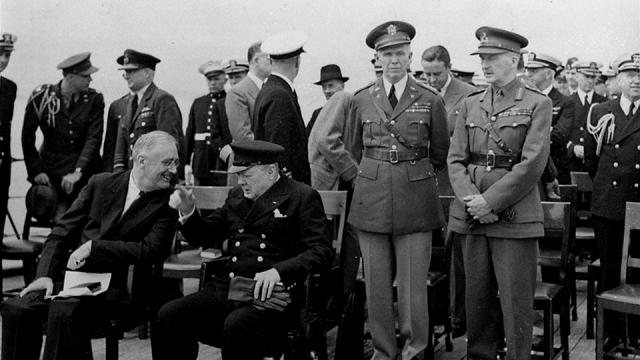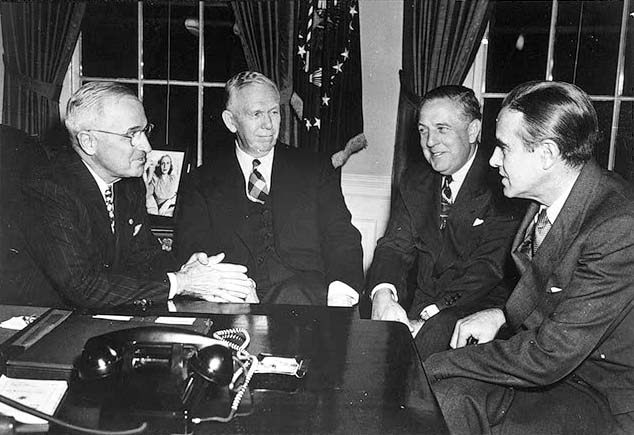
One of the cardinal principles of Western elites is that "we" are, by definition, "the good guys" and anyone "we" attack are "the bad guys." You could say that the golden rule of Western state violence is: terrorism is what they do; counterterrorism is what we do.
It is, of course, fine for journalists in the West to point to the crimes of official enemies, and to mock them for their transparent propaganda efforts. Thus, the BBC’s Emily Maitlis was able to introduce Newsnight with a touch of sardonic wit: "Hello, good evening. The Russians are calling it a 'peace enforcement operation.' It’s the kind of Newspeak that would make George Orwell proud."
Maitlis was referring to the invasion of Russian forces into the Georgian province of South Ossetia in August 2008. By contrast, it would be inconceivable for a BBC presenter to refer sceptically to the West’s invasion of Afghanistan, Iraq or Libya as a "peace enforcement operation," and to describe such language as "the kind of newspeak that would make George Orwell proud."
Corporate media reporting of the global financial and economic crisis of recent years fits the same biased pattern. From the perspective of power, it is important that a steadying hand is applied to the tiller of news and commentary on the crisis, as well as the global economy itself. The liberal media has its role to play in shoring up public confidence in a discredited, unjust system.
In the Guardian’s comment pages, star columnist Jonathan Freedland was permitted to express a glimmer of dissent in 2008, near the start of the current crisis. "Turbo-capitalism is not just unfair," he wrote, "it is dishonest and dangerous." He pleaded: "surely this is the moment when Labour and the center-left can dare to question the neoliberal dogma that has prevailed since the days of Thatcher."
Freedland’s dissection of the crisis was limited at best, timidly suggesting that "you could argue" that "capitalism is always [...] parasitical on the state." What he called for was a kinder, gentler form of capitalism instead of the "turbo-capitalism" which is happy to rely "on us, the public, and our instrument, the state, when it gets in trouble." Thin on details, he concluded weakly: "Now we should demand a say the rest of the time, too." It was grim fare indeed.
Economist Harry Shutt, author of several books, including The Trouble with Capitalism, notes astutely that one of the most striking features of the ongoing crisis is "the uniformly superficial nature of the analysis of its causes presented by mainstream observers, whether government officials, academics or business representatives." This applies very much to journalists too, not least in the liberal media.
Shutt continues:
Thus it is commonly stated that the crisis was caused by a combination of imprudent investment by bankers and others [...] and unduly lax official regulation and supervision of markets. Yet the obvious question begged by such explanations – of how or why such a dysfunctional climate came to be created – is never addressed in any serious fashion.
The Marshall Plan: Myth and Actuality
And then, of course, someone will pop up with a counter example; something that demonstrates that actually Western states can and do make huge gestures of benevolence. A classic case is the Marshall Plan, the post-World War II ‘rescue package’ implemented by the U.S. government, ostensibly to restore the devastated economies and infrastructure of Europe. The offer of aid was made to all of Europe, even including those parts under Russian occupation.
Walt Whitman Rostow, an economist who worked on implementing the Marshall Plan, and who later played a key role in the U.S. war against Vietnam, stated that the plan was actually part of an "offensive" which aimed "to strengthen the area still outside Stalin’s grasp." William Clayton, Undersecretary of State for Economic Affairs, raised fears in December 1947 that if Washington did not provide such aid, "the Iron Curtain would then move westward at least to the English Channel."
While the Marshall Plan had still been under discussion, Clayton had stated that ‘we will hold in our hands the powerful weapon of discontinuance of aid if contrary to our expectations any country fails to live up to our expectations.’ Chester Bowles, chief of the Economic Stabilization Bureau, was candid: "The real argument for the Marshall Plan is a bolstering of the American system for future years."
With the post-war ascendancy of the U.S. in global affairs, America was now flexing its muscles as part of its "special relationship" with the United Kingdom, the former seat of imperial power. The Marshall plan was a crucial political ace as part of this global muscle-flexing. In Washington, the British Embassy was informed "that Britain’s socialismcould stand in the way of the loan...Congress was greatly concerned to establish that U.S. dollars weren’t going to be used to bolster up a red dictatorship or, equally perverse, to subsidize welfare measures [in Britain]."
The British Consul General Frank Evans reported that he "could not but be depressed by the violent dislike and distrust manifest by these men towards the British experiment in social democracy."
U.S. pressure was exerted on U.K. policy; in particular, to abandon any further reforms such as nationalization. In July 1947, the U.S. Ambassador said bluntly: "It would help the U.S. obtain from congress the help which the United Kingdom required if it were made clear that there would be no further nationalization of great industries in this country." In June 1948, the Foreign Office recommended that the nationalization of iron and steel should be postponed if not abandoned for the sake of "Anglo-American relations."
Not much of this is ever mentioned today.
The above is an adapted extract from the author's new book, "Why Are We The Good Guys? Reclaiming Your Mind From The Delusions Of Propaganda," published by Zero Books.
3 WAYS TO SHOW YOUR SUPPORT
- Log in to post comments












